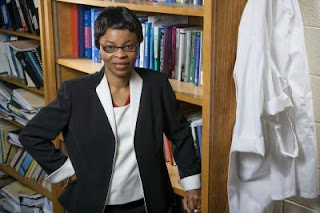BINGHAMTON, NY -- Interest in 'green' innovation means not just thinking big but also very, very, very small.
At least that's the way Omowunmi Sadik, director of Binghamton University's Center for Advanced Sensors and Environmental Systems, sees it. She's working to develop sensors that would detect and identify engineered nanoparticles. Her research will advance our understanding of the risks associated with the environmental release and transformation of these particles.
"Society has a duty to not only consider the positive sides of science and technology but also the not-so-desirable sides of technology itself," said Sadik, a professor of chemistry. "We need to think not just about how to make these nanoparticles but also about their impact on human health and the environment."
Sadik and a Binghamton colleague, Howard Wang, have received funding from the Environmental Protection Agency to design, create and test sensors for monitoring engineered nanoparticles and naturally occurring cell particles.
"We need to understand the chemical transformation of these materials in the ecosystem so we can take action to prevent unnecessary exposure," Sadik said. Her lab has already created a membrane that will not only trap a single nanoparticle but also provide a means of signal generation. It uses cyclodextrin, whose molecular structure resembles a tiny cup. "It can be used not only as a sensor, but also for cleanup," Sadik said.
That discovery and others make Sadik believe that nanotechnology may also prove useful in the remediation of environmental pollutants. Green nanotechnology could even reduce the use of solvents and result in manufacturing protocols that produce less waste, she said.
For instance, Sadik has used nanoparticles to transform Chromium 6, a known carcinogen, into Chromium 3, which is benign. "I do see the positive side of it," she said.
"We want to be able to develop nanomaterials while avoiding the unintended consequences of such developments," Sadik added. "We don't want to stop development, but we do want to encourage responsibility." ###
Contact: Gail Glover gglover@binghamton.edu 607-777-2174 Binghamton University















No comments:
Post a Comment